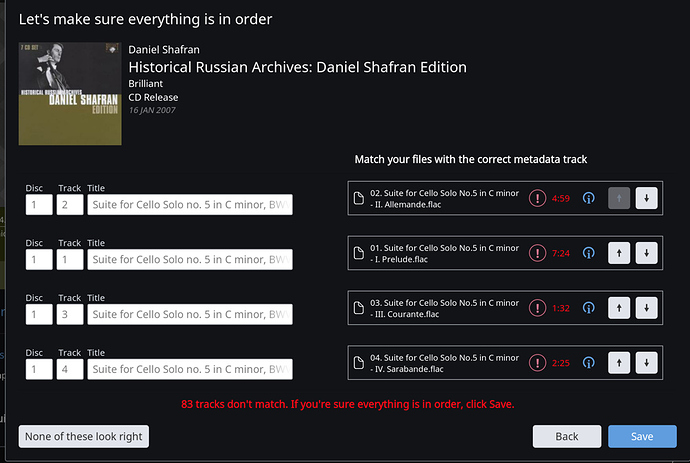I apologize to those who contributed to this thread, but I realize that I didn’t provide a proper framework for my original question. Nor was my question complete. So allow me a mulligan, please.
Background: I had an album whose only reasonable Roon match was a trackless one (described above) that had just the art and title, no tracks. I, like Ludwig, usually accept Roon’s match for the art and some of the credits. Better off than I was before I started, I figure. So I did. Also, to avoid mysteries, I Reverted all previous user edits.
Next, I got the tracks ready to be IDed. I have had lots of practice and some success doing this. [I, like Ludwig, do most all of my edits outside of Roon using Yate, Metadatics and/or mp3tag. Occasionally I use Roon for minor, cosmetic edits.]
My general strategy is to check for full composer names for set of tracks and to amend composition and movement titles so that they match reality and use a syntax similar to other library or TIDAL performances.
I have learned through trial and error that successful composition IDing depends upon at least the following: a very specific wording of the work’s name (which can include a number and a musical key and maybe modifying words such as “…for orchestra” or “…for solo piano”) ; an opus, if it has been assigned one; and a composer’s full name (“Bach” doesn’t work at all; " Bach" must be used because of all the talented relatives.)
I have also learned that, even after careful attention to these details, Roon may still fail to ID the work. I have been told that Roon sometimes needs to triangulate on a match using imported TIDAL albums (my words),
To maximize chances for success, I used Roon’s WORK and PART tags (not WORK NAME and MOVEMENT NAME). I then carefully split each track’s title into WORK and PART tags, careful to abide by the wording that Roon has recognized with other performances.
I decided not to search MusicBrainz or Discogs via my tagger because I didn’t want to confound Roon’s ID process.
Once all necessary edits were made, I saved my tagger’s changes and waited for Roon’s processing to finish, and the result was:
Practically NOTHING. No change in work or part titles, no change in composition grouping, and certainly no change in linking success. Roon did accept my composer edits.
Roon continued to display an un-munged track title and ignored my my entries to PART and WORK tags.
Since this set of events made no sense to me, I tried to figure out why.
I guessed that Roon was not reacting to my edits because it had successfully IDed the album (Ludwig called it “locking the metadata as usual”). Joel said the ID could not have been the reason for my phenomenon. I accept that and I admit that I was guessing, but that was all I could muster.
And my album remains unfixed.
So with this new background, my revised question is: what are all of the reasonable ‘circumstances’ (such as file conditions, tag settings, user preferences, a specific user error, or the like) under which Roon will refuse/fail/neglect to reflect a user’s changes to an album’s file tags?
A complete answer will allow me, maybe others, to anticipate tagging problems in the future and avoid having to tease it out of my/our continued trial and error process.
I also acknowledge that I could, and perhaps should, just not bother.
